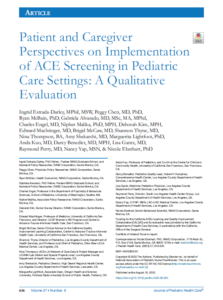
Adverse childhood experiences (ACEs) are traumatic events linked to long-term negative health outcomes. To address these impacts, pediatric clinics in Los Angeles County implemented ACE screening as part of California’s ACEs Aware initiative, which promotes trauma-informed care. This study explored the perspectives of adolescents and caregivers on the acceptability and impact of ACE screenings in five pediatric clinics serving diverse, low-income populations.
The study found that ACE screening was generally well-accepted by both adolescents and caregivers, with many participants recognizing its potential to foster trust and improve care outcomes. However, implementation challenges were identified, including logistical barriers, privacy concerns, and insufficient communication about the screening process. Results highlighted the importance of clear messaging, privacy safeguards, and tailored approaches to meet the needs of specific populations, such as foster families and non-English speakers.
These findings underscore the value of integrating trauma-informed care principles into pediatric practice and refining workflows to ensure the successful implementation of ACE screening.